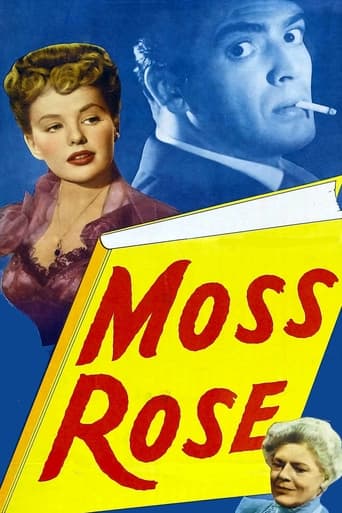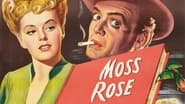Alex da Silva
Cockney Music Hall dancer Peggy Cummins (Rose) is travelling on a train and reminisces about her life and, in particular, the recent occurrences which cue the film into a flashback sequence. We start with her friend and co-dancer Margo Woode (Daisy) and Woode's relationship with upper class Victor Mature (Drego). Cummins wants to be a lady and live the lifestyle afforded to those in high society. We follow her dream as detective Vincent Price investigates murder. And where are these moss roses and bibles appearing from? This is a thriller that successfully keeps you guessing as to who the murderer is. The only nuisance with the film is Cummins and her cockney accent. First of all, it's rubbish. Secondly, she keeps slipping in and out of it throughout the film – what is she doing? I always find that Ethel Barrymore creeps me out and she does the same in this film as she plays the role of Mature's mother. Her face is weird. The rest of the cast are all fine and the settings and locations provide a rewarding atmosphere. The ending is pretty standard stuff, especially if you have seen numerous films of this sort. However, it is still an entertaining journey through foggy London and a wealthy estate.I guess the moral of the story has something to do with there being nothing wrong with aspirations to be somewhere else in life, but you may have to resort to underhand tactics and there could be a bit of murder to get through before you can realize the dream. Maybe just stick to Shoreditch – I believe it's pretty trendy these days.
PrairieCal
Various internet sources state that the film "Moss Rose" was based on the Joseph Shearing novel, "The Crime of Laura Sarelle." This is simply not true as any reading of that novel will clearly show. The 1947 film "Moss Rose" was based on the 1934 Joseph Shearing Novel, "Moss Rose." And although the film plot varies greatly from the novel, the basic story is quite similar and many of the same character names were used in the film. The novel was based on the 1872 murder of a London prostitute, well before Jack the Ripper appeared on the scene.Incidentally, Joseph Shearing was one of many pen names used by Marjorie Bowen (another pen name) who was born Gabrielle Margaret Vere Campbell and later married Arthur L. Long. She wrote many thrillers, romances, and novels of the supernatural, all under various pen names.In any event, the film "Moss Rose" exudes Victorian/Edwardian atmosphere and suspense and is well worth watching. Truly, they don't make them like this any more.
Spikeopath
Moss Rose is directed by Gregory Ratoff and adapted to screenplay by Niven Busch, Jules Furthman and Tom Reed from the novel The Crime of Laura Saurelle written by Joseph Shearing. It stars Peggy Cummins, Victor Mature, Ethel Barrymore, Vincent Price, Margo Woode, George Zucco, Patricia Medina and Rhys Williams. Music is by David Buttolph and cinematography by Joseph MacDonald. Somebody is killing Michael Drego's (Mature) lovers and leaving behind a bible and a compressed dried moss rose. When her dancer friend is one of the victims, Belle Adair (Cummins) thinks she knows who the killer is and sets about blackmailing him for an unusual request... British set Gothic noir pulsing with maternal pangs and whodunit shenanigans, Moss Rose has much to recommend to the like minded adult. Lets not beat around the bush, though, motivations of the principal players are decidedly weak and the police fare little better in the brain department. However, once one settles into the atmosphere brought out by MacDonald's (Niagra/Pickup On South Street) beautiful photography - and got tuned into Cummins' brash London accent - then it can sustain interest. It's more successful as a mood piece when out on the London streets than it is at the Drego mansion, though the period design of costuming and sets is most appealing. Mature often came in for some stick for his acting, but I have sometimes thought much of it was unfair. Here though he is not quite right for the role, it feels like what it is, a name on the poster to draw the punters in. But his performance still works on sombre terms, besides which, Cummins and the wonderful Barrymore pretty much dominate proceedings anyway. Price fans should note that he isn't in it much, and even then it's late in the picture, but he's suitably stylish and you can't help thinking he probably should have had the Michael Drego role instead! Meanwhile Ratoff (Black Magic) directs without fuss and histrionic filler. An enjoyable ride with visual treats along the way, with a finale to nudge you to the edge of your seat. 7/10
ottoflop
Gabrille Margaret Long, writing under the names of Majorie Bowen and Joseph Shearing wrote many fascinating novels based upon actual murder cases using her own interpretations as to what actually happened and who was really guilty. This novel and film "Moss Rose" is based upon an 1873 murder of a prostitute named Buswell, which was never solved. Other Shearing novels turned into films around this time are "Blanche Fury" and "Mark of Cain ("Airing in a Closed Carriage" based upon the Maybrick case).Shearings novels are very hard to adapt and the film "Moss Rose" differs very much from the novel. So much so, that outgside of the basic idea it is almost a complete revision of the novel. Nevertheless, this film is very well produced with the sets and costumes capturing the late Victorian ambiance and a outstanding performance from England's Peggy Cummins. She captures the spunky cockney persona of "Belle Adair", while showing the vulnerability of a young woman alone in the world and making her way during an era of very closely defined social classes. Even when she is blackmailing a aristocratic family, she is still likable.All in all, very well done and well worth watching.




